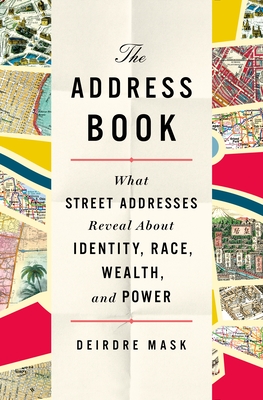The Address Book: What Street Addresses Reveal about Identity, Race, Wealth, and Power
Description of The Address Book: What Street Addresses Reveal about Identity, Race, Wealth, and Power
Finalist for the 2020 Kirkus Prize for Nonfiction
"An entertaining quest to trace the origins and implications of the names of the roads on which we reside." —Sarah Vowell, The New York Times Book Review
When most people think about street addresses, if they think of them at all, it is in their capacity to ensure that the postman can deliver mail or a traveler won’t get lost. But street addresses were not invented to help you find your way; they were created to find you. In many parts of the world, your address can reveal your race and class.
In this wide-ranging and remarkable book, Deirdre Mask looks at the fate of streets named after Martin Luther King Jr., the wayfinding means of ancient Romans, and how Nazis haunt the streets of modern Germany. The flipside of having an address is not having one, and we also see what that means for millions of people today, including those who live in the slums of Kolkata and on the streets of London. Filled with fascinating people and histories, The Address Book illuminates the complex and sometimes hidden stories behind street names and their power to name, to hide, to decide who counts, who doesn’t—and why.
"An exuberant work of popular history: the story of how streets got their names and houses their numbers, and why something as seemingly mundane as an address can save lives or enforce power. When most people think about street addresses, if they think of them at all, it is in their capacity to ensure that the postman can deliver mail or a traveler won’t get lost. But street addresses were not invented to help you find your way; they were created to find you. Addresses arose out of a grand Enlightenment project to name and number the streets, but they are also a way for people to be identified and tracked by those in power. As Deirdre Mask explains, the practice of numbering houses was popularized in eighteenth-century Vienna by Maria Theresa, leader of the Hapsburg Empire, to tax her subjects and draft them into her military. In many parts of the world, your address can reveal your race and class, causing them to be a shorthand for snobbery or discrimination. In this wide-ranging and remarkable book, Mask looks at the fate of streets named after Martin Luther King, Jr., the wayfinding means of ancient Romans, how Nazis haunt the streets of modern Germany, and why numbered streets dominate in America but not in Europe. The flipside of having an address is not having one, and we see what that means for millions of people today, including those who live in the slums of Kolkata, on the streets of London, or in post-earthquake Haiti. Filled with fascinating people and histories, The Address Book illuminates the complex and sometimes hidden stories behind street names and their power to name, to hide, to decide who counts, who doesn’t-and why"
Table of Contents:
Introduction: West Virginia: Why Should We Care About Street Addresses?
DEVELOPMENT
1. Kolkata: Could Addresses Revolutionize the Slums?
2. Haiti: Could Street Addresses Stop a Plague?
ORIGINS
3. Rome: How Did The Ancient Romans Find Their Way Around?
4. London: Where Do Our Street Names Come From?
5. Vienna: Did House Numbering Change the World?
6. Philadelphia: Why Do Americans Love Numbered Streets?
7. Korea and Japan: Does Language Explain Japan’s Lack of Street Names?
POLITICS
8. Iran: Why Do Street Names Follow Revolutions?
9. Berlin: What Do Nazi Street Names Tell Us About Vergangenheitsbewältigung?
RACE
10. Hollywood, Florida: Are Confederate Names Really About History?
11. St. Louis: What Can Martin Luther King Streets Tell Us About Race in America Today?
12. South Africa: What Should Happen to Apartheid Streets?
CLASS AND STATUS
13. Manhattan: How Much Is a Street Name Worth?
14. Homelessness: How Do You Live Without an Address?
15. Chicago: Does Everyone Deserve an Address?
Conclusion: The Future: Are Street Addresses Doomed?
ACKNOWLEDGMENTS
NOTES
INDEX
The Address Book: What Street Addresses Reveal about Identity, Race, Wealth, and Power is categorized under the following categories. You can browse these categories to find other titles filed in the same way:



